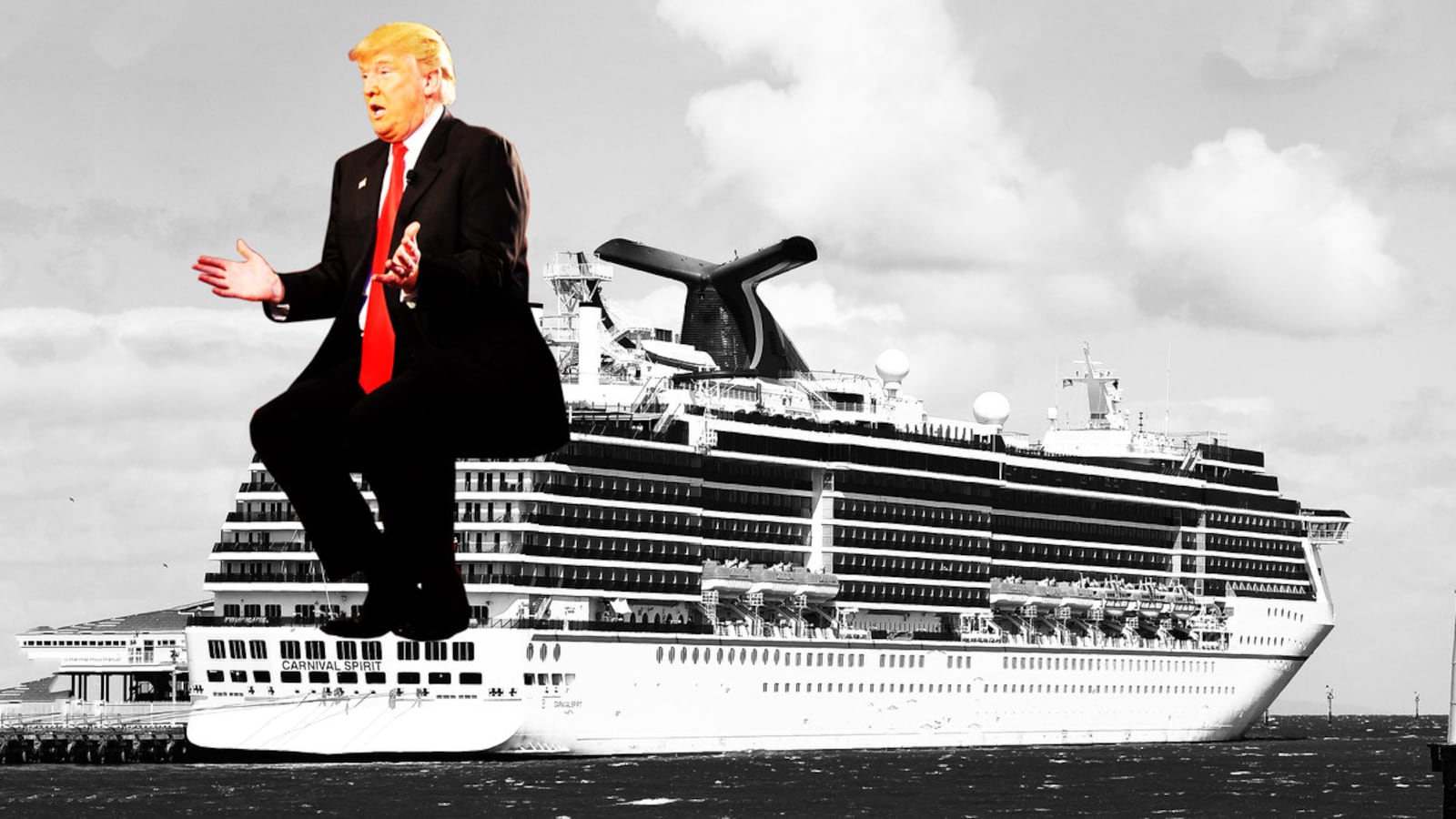Get out your checkbooks. The rich are about to ask for another handout.
Yes, the airline industry used 96 percent of its free cash flow during the last decade on stock buybacks. Yes, that’s tens of billions of dollars it could have used as a safety net to aid it in times like these. But Monday, in the wake of the industry saying it wanted a $50 billion handout from the government to help it get through the current downturn in travel, the president said the U.S. will back them up as needed. Cruise-line executives have indicated they would need help. Energy executives hurt by plummeting oil prices are already getting help through the government’s plan to buy oil for the national strategic reserves. Hotel owners have said they may “need” assistance from our Hotelier-in-Chief, who knows something about their businesses and plenty about using other people’s money to get out of tight spots. And Monday night, even the casinos got in on the action and put their hands out.
The question now is what remains for the rest of us as markets are being rocked as never before thanks not only to the crisis but due to its mishandling by the president, his team, and other nearly as bad governments worldwide. (I’m looking at you, Boris Johnson, and your insane idea of letting the disease run its course in the hopes of creating “herd immunity,” while potentially losing hundreds of thousands of British lives along the way.)
Monday’s losses were the worst since the financial crisis of 1987. The market has lost a third of its value in just about a month. The Dow Jones Industrial Average is closing in on the level it was at the day Trump took office, meaning that over his three plus years in office, it has effectively produced zero return.
Trump had long been planning to run for a second term on his market prowess. “Yes, I may be a Russian asset, an accused rapist, and a racist but check out what I did for your bank account” was more or less his campaign strategy. Now, with a recession having begun and the markets tanking, the president is palpably afraid. Freaking out. And he is trying to do anything to get the markets to stop circling the drain.
First, he tried lying about the outbreak of COVID-19, saying it was nothing and that we’d be over it quickly. Markets didn’t believe him and down they went. Then, he mobilized a task force. But he kept contradicting it and it was clear many of the members were picked not for expertise but for loyalty, like the president’s loyal human Golden Retriever, science-denier Mike Pence. The markets went down. He pushed the Federal Reserve for rate cuts. The markets went down. He gave an Oval Office address. The markets went up for a day, and then back down. The Fed followed one rate cut with another, taking interest rates to zero. The markets kept going down.
The problem was that throughout this period the virus spread (and matters were not helped by an oil price war between the Saudis and the Russians that deserves further scrutiny re: what Team Trump knew about it and when). Gradually, it became clear that the only way to stop the spread of the highly contagious disease was to radically curtail human interaction in societies worldwide. As a result, entire countries have been shut down. The president said Monday that the U.S. might expect to be largely shut down through July or August.
Needless to say, businesses and workers are worried because they have never seen a situation like this. Restaurants, bars, hotels, gyms, retail, sporting and cultural events have shuttered in major cities. Entire industries have effectively been barred from operating. And many of the workers involved in those businesses are without health-care insurance, without savings, without guaranteed incomes, without an alternative way to make ends meet.
Pain is coming. And if the experience of 2008 and 2009 is any indication, big bailouts will follow—and the primary beneficiaries of those bailouts will be wealthy Americans and the politicians they call their own. Yes, in 2009, the auto industry was bailed out to save jobs. But the companies we saved and their shareholders were the biggest beneficiaries. Yes, banks were bailed out after the financial crisis to provide liquidity, ostensibly so that vulnerable businesses could protect their employees. But the reality is that the big bankers that caused the crash were never held to account for their reckless efforts to game the system, while many “regular” Americans still aren’t whole more than a decade later. The bankers quickly resumed receiving their bonuses, the banks continued to grow, and they and other well-off Americans did better and better. In fact, according to economists Emmanuel Saez and Thomas Piketty, five years after the crisis began a staggering 95 percent of the income gains associated with recovery went to the top 1 percent of Americans.
As Sen. Elizabeth Warren puts it in a new op-ed at CNN, “Our government offered a no-strings-attached bailout to the same giant banks that had driven our economy over a cliff. Meanwhile ,the government did too little for most homeowners facing foreclosure.” Warren argues rightly that while a major bailout package will be needed to save the economy, we need to make sure it is targeted at helping all Americans, especially the most vulnerable and not concentrating benefits in the hands of the rich and powerful.
She argues a stimulus is needed of roughly $750 billion, the same number called for by Senate Minority Leader Chuck Schumer. But she argues for a grass-roots approach that protects workers and families with “closing gaps in paid-leave policies already approved by the House” and increasing Social Security benefits, providing a broad cancellation of student-loan debt (far beyond Trump’s proposed temporary waiving of interest on federal student loans) and stopping evictions and foreclosure proceedings, helping the homeless and building new homes. Finally, she argues that any money that goes to big companies to help their employees should be used to help the employees and must come “with strings attached to ensure that the money goes to maintain payroll, not to enrich shareholders or pay executive bonuses.”
She is right, of course. We should not bail out executives so they can maintain payments on their second homes or their yachts. If a company takes money from the federal government, the conditions attached should include that it be paid back with interest and upside and that the companies accept a period, say three to five years, during which they cannot do stock buybacks, top executives receive no bonuses, and their compensation is frozen.
Warren’s belief that we should spread relief beyond the big corporate bailouts we’re become used to is shared by a wide range of leaders, some of whom might not be the usual suspects. For example, Sen. Mitt Romney has taken a page out of Andrew Yang’s playbook and suggested that during the crisis we provide $1,000 to every adult American as a kind of emergency, temporary universal basic income. This worthy idea should, of course, include means-testing or other provisions to ensure we don’t spend to help those who don’t need help and do the most we can for those who do need it.
Nobel Prize-winning economist Joseph Stiglitz has noted that we need to come up with new ideas to help the gig-economy workers who lack the stability or benefits associated with traditional jobs and who will be especially hard hit for what is likely to seem like a depression for the service sector in many big American cities. In Europe, governments are also innovating, with France’s President Macron declaring France to be “at war” with the virus in the same address in which he pledged that no Frenchman or Frenchwoman would be allowed to suffer without food or shelter and that no French business would be permitted to go bankrupt. Taxes, energy bills, and social charges would also be suspended for the time being. In Italy, the government announced a mortgage holiday during the crisis.
Here in the U.S., with interest rates at zero, another stimulus option would be to acknowledge that the markets would effectively be paying the U.S. government to borrow money and to finally launch a major initiative to invest in neglected American infrastructure that would create jobs and improve American competitiveness for decades to come. It would be a sin to miss this chance to do the work that needs to be done when it is more affordable and needed than ever before.
In the weeks and months ahead, as the country struggles and elections loom, rest assured politicians will have every motivation to fashion a massive recovery package. We don’t know much about what this crisis will bring, but that there will be such a stimulus is an absolute certainty. Budget hawks will forget about deficits. The most zealot capitalists will preach the necessity of a big government handout for their buddies and most important donors.
The result is that the next big question facing America’s leaders and voters will be whether that package will repeat past mistakes and compound America’s egregious economic inequities while rewarding imprudent executives (and politicians) for their failures of foresight—or whether the steps taken will actually assist those most in need, invest where America’s needs for help are the greatest, and ensure that borrowers serve national interests rather than their own.
How that question is resolved will not only determine the effectiveness of the effort but whether after this crisis we as a nation are further weakened or strengthened by the experience and the effort.







